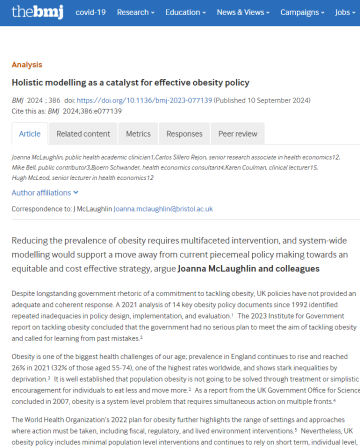Holistic modelling could help shift the dial on obesity
- 10 September 2024
An holistic modelling approach to evaluating obesity interventions could significantly improve policy effectiveness, according to a new paper published in the BMJ. The analysis was led by National Institute for Health and Care Research (NIHR) funded researchers at the University of Bristol alongside Germany’s Agency for Health Economic Assessment and Dissemination.
Obesity continues to rise in the UK, despite different Governments producing numerous obesity policies over many decades.
The authors explored why UK obesity policy does not deliver on the political commitment to reducing obesity. They argue obesity reduction strategies are inadequate and incoherent because appraisals of interventions are siloed and fragmented.
The team examined how economic evaluation is used to help policymakers choose which obesity interventions and treatments to fund. A 2023 Institute for Government report concluded that current obesity reduction approaches focus on short-term, narrow outcomes from individual interventions. Basing decisions on fragmented evaluations risks skewing funding towards inadequate, treatment-focused interventions.
The authors of the new analysis suggest that a holistic modelling approach could significantly enhance the information available to policymakers. This type of approach considers the combined and long-term effects of multiple interventions, rather than focusing on individual outcomes.
This could identify the most impactful strategies. This in turn would lead to a more coordinated and cost-effective response to obesity which takes health inequalities into account. It could shift the UK’s strategy to a more robust and equitable approach which better incorporates prevention.
This would not only improve the overall effectiveness of obesity policies but also ensure that resources are allocated more efficiently, addressing the root causes of obesity and reducing health inequalities.
Dr Joanna McLaughlin, lead author of the paper and NIHR Clinical Lecturer and Specialty Registrar in Public Health at the University of Bristol, said:
“Because the options for obesity interventions are currently evaluated in a fragmented and siloed way, policymakers are not well supported to take the bold decisions needed to form a truly effective obesity strategy for the UK.
“Our analysis calls for the use of modelling capable of showing how different interventions fit together, whether they will do enough in combination, and whether their impact will address health inequalities alongside value for money.”
The team want to develop and refine holistic models to estimate the long-term impacts of combining various obesity interventions. The approach could serve as a model for other public health challenges.
The analysis was supported by the NIHR Applied Research Collaboration (ARC) West and the NIHR Bristol Biomedical Research Centre (BRC).
